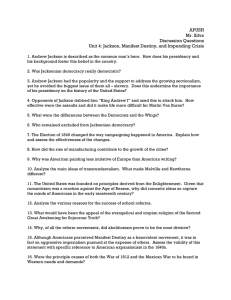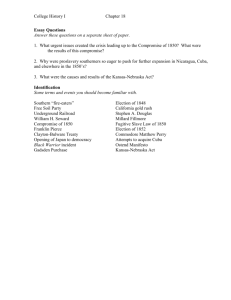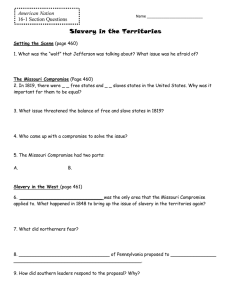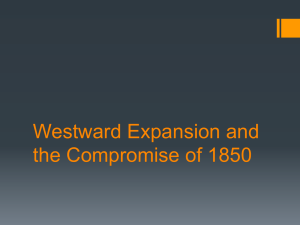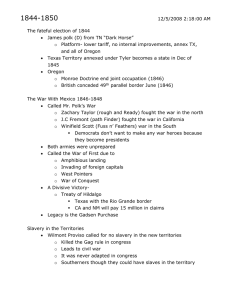Review Sheet for 1301 Final.doc
advertisement
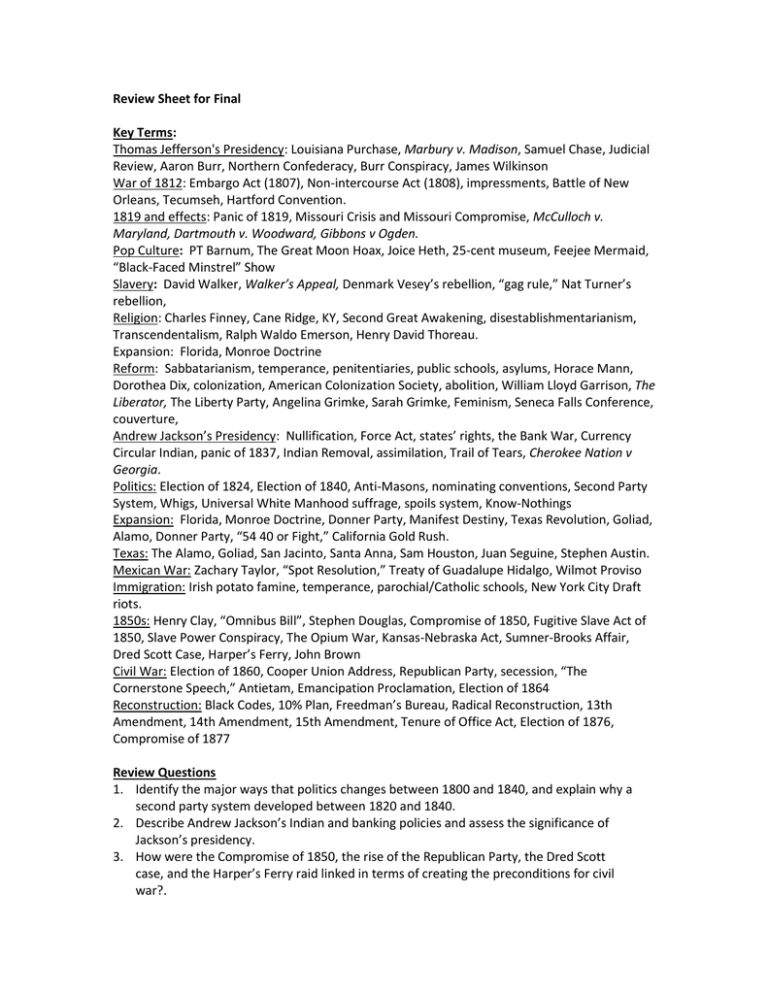
Review Sheet for Final Key Terms: Thomas Jefferson's Presidency: Louisiana Purchase, Marbury v. Madison, Samuel Chase, Judicial Review, Aaron Burr, Northern Confederacy, Burr Conspiracy, James Wilkinson War of 1812: Embargo Act (1807), Non-intercourse Act (1808), impressments, Battle of New Orleans, Tecumseh, Hartford Convention. 1819 and effects: Panic of 1819, Missouri Crisis and Missouri Compromise, McCulloch v. Maryland, Dartmouth v. Woodward, Gibbons v Ogden. Pop Culture: PT Barnum, The Great Moon Hoax, Joice Heth, 25-cent museum, Feejee Mermaid, “Black-Faced Minstrel” Show Slavery: David Walker, Walker’s Appeal, Denmark Vesey’s rebellion, “gag rule,” Nat Turner’s rebellion, Religion: Charles Finney, Cane Ridge, KY, Second Great Awakening, disestablishmentarianism, Transcendentalism, Ralph Waldo Emerson, Henry David Thoreau. Expansion: Florida, Monroe Doctrine Reform: Sabbatarianism, temperance, penitentiaries, public schools, asylums, Horace Mann, Dorothea Dix, colonization, American Colonization Society, abolition, William Lloyd Garrison, The Liberator, The Liberty Party, Angelina Grimke, Sarah Grimke, Feminism, Seneca Falls Conference, couverture, Andrew Jackson’s Presidency: Nullification, Force Act, states’ rights, the Bank War, Currency Circular Indian, panic of 1837, Indian Removal, assimilation, Trail of Tears, Cherokee Nation v Georgia. Politics: Election of 1824, Election of 1840, Anti-Masons, nominating conventions, Second Party System, Whigs, Universal White Manhood suffrage, spoils system, Know-Nothings Expansion: Florida, Monroe Doctrine, Donner Party, Manifest Destiny, Texas Revolution, Goliad, Alamo, Donner Party, “54 40 or Fight,” California Gold Rush. Texas: The Alamo, Goliad, San Jacinto, Santa Anna, Sam Houston, Juan Seguine, Stephen Austin. Mexican War: Zachary Taylor, “Spot Resolution,” Treaty of Guadalupe Hidalgo, Wilmot Proviso Immigration: Irish potato famine, temperance, parochial/Catholic schools, New York City Draft riots. 1850s: Henry Clay, “Omnibus Bill”, Stephen Douglas, Compromise of 1850, Fugitive Slave Act of 1850, Slave Power Conspiracy, The Opium War, Kansas-Nebraska Act, Sumner-Brooks Affair, Dred Scott Case, Harper’s Ferry, John Brown Civil War: Election of 1860, Cooper Union Address, Republican Party, secession, “The Cornerstone Speech,” Antietam, Emancipation Proclamation, Election of 1864 Reconstruction: Black Codes, 10% Plan, Freedman’s Bureau, Radical Reconstruction, 13th Amendment, 14th Amendment, 15th Amendment, Tenure of Office Act, Election of 1876, Compromise of 1877 Review Questions 1. Identify the major ways that politics changes between 1800 and 1840, and explain why a second party system developed between 1820 and 1840. 2. Describe Andrew Jackson’s Indian and banking policies and assess the significance of Jackson’s presidency. 3. How were the Compromise of 1850, the rise of the Republican Party, the Dred Scott case, and the Harper’s Ferry raid linked in terms of creating the preconditions for civil war?. 4. Discuss the basic causes of the Civil War. Was the war a so-called “irrepressible conflict” (unavoidable) or the result of fanatics and bumbling politicians? 5. Why did the North win the Civil War? 6. Describe the major issues faced by the nation during Reconstruction. Why did it “end” in 1877? Potential Essays 1. How did the Civil War transform American society? Using SPECIFIC examples, how did the United States continue and cement its transformation to an industrial power while the South was absent from the Union? How did it represent the final triumph of Hamilton’s ideas over Jefferson’s? In your estimation was the Civil War a revolution? Why or why not? 2. On the surface, many things had absolutely nothing to do with slavery, and yet had everything to do with it. Using each of the following, identify each and explain their relationship to slavery in the United States: Indian removal, nullification, westward expansion, Texas’ annexation, and the Mexican War. 3. Discuss the widening gulf between the north and south in terms of politics, immigration, society, and economics. What role did expansion play in this? How did the conflicts over Texas, the Mexican War, and expansion of slavery increase the tensions
